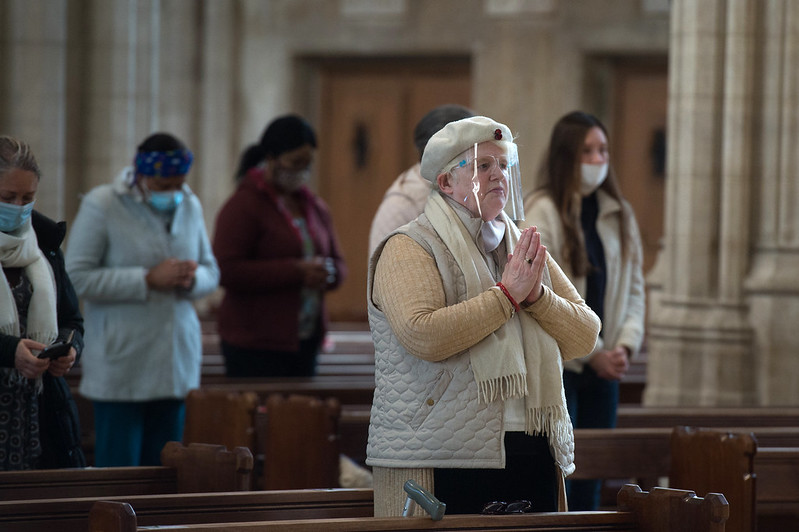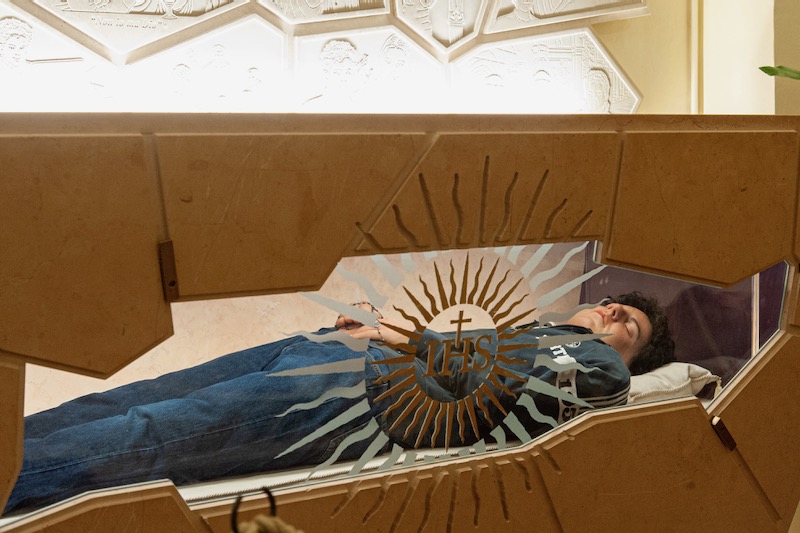I missed the beatification of Carlo Acutis by a week, but by the time I turned up in Assisi the crowds were still gathered in front of the Shrine of the Spoliation, the Church of Saint Mary Major, once the cathedral of Assisi, where Saint Francis ripped off his clothes in front of Bishop Guido and his horrified parents as a sign of his complete renunciation of the world. The shrine is now the burial place of the Blessed Carlo Acutis; I visited for four days running, and each day there was a long patient queue waiting to walk slowly past the tomb and see the uncovered relics.
I have just Googled his name and it garnered 6,980,000 hits. His beatification has been an internet phenomenon. In a world where bite size chunks are all we can manage, his sayings, his life, so short, yet profound, are easily digestible. But nothing, nothing at all, can prepare you for the sight of the Blessed Carlo lying in his tomb. I do not know what the pilgrims who had come to see him were thinking, but the atmosphere of prayer and power were tangible.
Much has been made of the way the young Blessed is dressed: jeans, Nike trainers, tracksuit top. His face is covered with a silicone mask as are (I assume) his hands, though the latter are perfectly lifelike. When you are bereaved, when someone close to you dies, there will be for you the one thing that upsets you the most. For me this is the request from the undertakers for clothes with which to dress the dead body. I don’t quite know why, but this was for me the very worst thing with the death of both my parents. That the dead should wear the clothes of the living just seems so wrong. And here is the Blessed Carlo dressed as if he were alive.
Reading two books about Carlo, both in Italian, one by the Bishop of Assisi, Domenico Sorrentino (Carlo Acutis e Francesco d’Assisi, Perugia 2019) that makes the parallel with the life of Saint Francis; another by a conventual Franciscan (G. Paris, Carlo Acutis, il discepolo prediletto, Padua 2019) that makes the parallel with Saint John the Evangelist, the thing that struck me was the terrible, awful grief that his parents and grandparents must have felt when, within the short space of a week, he was hospitalised, diagnosed with leukaemia, died and was buried. He was 15 and an only child. (After his death, his parents had twins, I am happy to say, who are now ten years old.) That bereavement must have been devastating. How could it be anything but?
Carlo’s mother, Antonia, tells the story that a nun in Assisi assured her that her son would play a major role in the Church; she had assumed that this meant he would be a priest, and perhaps become Pope. People like to make prophecies over small children. We forget the ones that don’t come true and remember those that do. Blessed Carlo Acutis is now playing a major role in the Church, and a greater role than any Pope. That prophecy has come true, though not quite in the way anyone could imagine.
What I got from my daily visits from the tomb was this, something deeply personal, yet universal. People die, and especially if they are young, all the things they might have become die with them. But God takes them to himself and repairs the damage of death, undoes the grief of loss. What is lost is replaced by something greater. “I will spend my heaven doing good on earth,” said Saint Thérèse, who died in her early twenties. As Saint Francis was on his last journey, blind, bedridden and dying, he blessed Assisi and predicted it would be a source of grace to future generations. He was 45. “Do not be afraid because with the Incarnation of Jesus, death becomes life, and there’s no need to escape: in eternal life, something extraordinary awaits us,” said Carlo, dying at 15. “Behold, I make all things new!” (Revelations 21:5). “I will restore to you the years that the locust hath eaten.” (Joel 2:25). Impossible promises?
Like Carlo Acutis, Thérèse was not well known when she was alive, but after her death she has become one of the most significant figures in the Church. Saint Francis’ influence after his death has been prodigious. The child Carlo belonged to his parents and undoubtedly brought them great joy. Now he belongs to the whole Catholic Church. As he was to them, so may he be to us.



 Loading ...
Loading ...
What do you think?
You can post as a subscriber user ...
User comments (0)